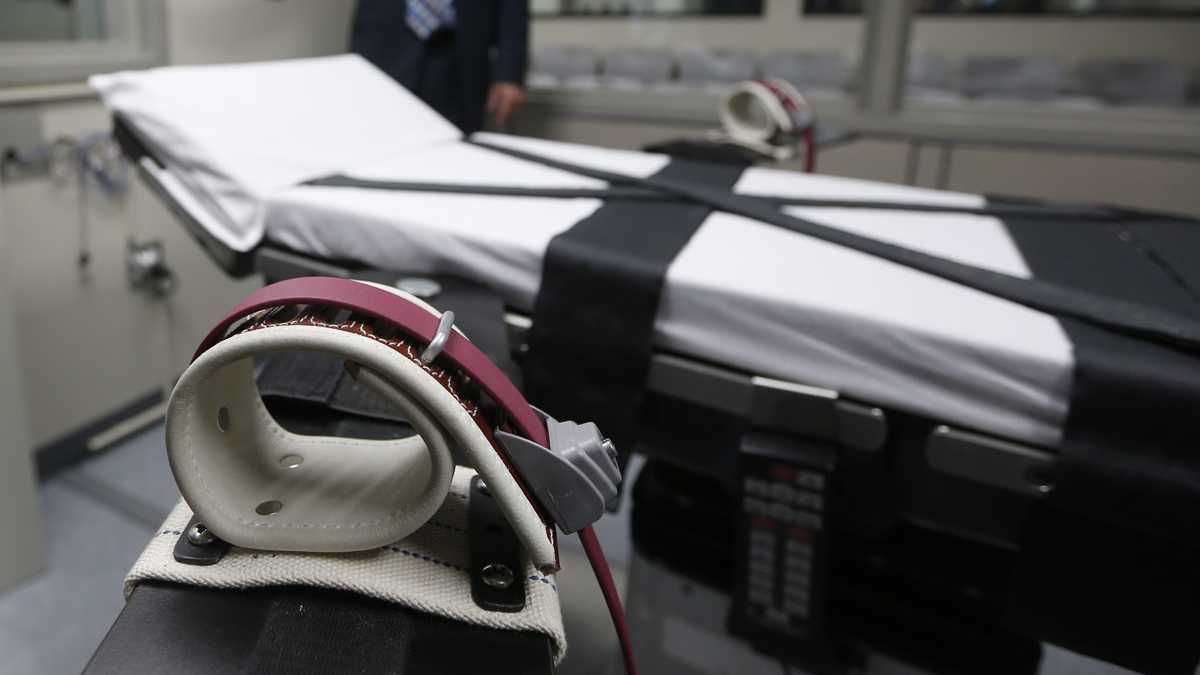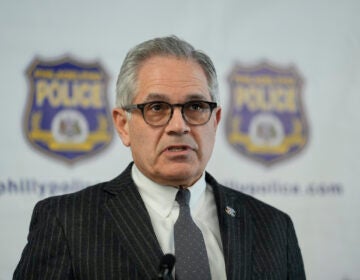The next DA should oppose racist and immoral death penalty

This 2014 image shows an arm restraint of a gurney in an execution chamber. (Sue Ogrocki/AP Photo, file)
Although the district attorney race in Philadelphia is celebrated time and time again as a progressive race, there are important differences among the candidates on key issues. One of those issues is the death penalty.
Last week, in a Democratic DA candidate forum organized by the Philadelphia Coalition for a Just District Attorney, only two of the six candidates who were able to attend were willing to answer “yes” to this question: “Do you commit to categorically refusing to seek the death penalty during your tenure?” Those candidates were Larry Krasner and Tariq El Shabazz.
[Editor’s note: Rich Negrin, who did not attend the forum because he was ill, is on record as supporting Gov. Tom Wolf’s moratorium on the death penalty. He reiterated this position at a candidate forum on April 27, hosted by WHYY, WURD, and the NAACP.]
Although no candidate seems excited about pursuing the death penalty, most are unwilling to completely rule out its use. That is reason for true concern.
The United States of America is the only liberal democracy that uses the death penalty. In 2015, it ranked fifth in the world in the number of executions right after China, Iran, Pakistan, and Saudi Arabia. In 2013, the last year with published data from the Bureau of Justice Statistics, 2,979 prisoners were under sentence of death (i.e., on “death row”) in the U.S. Of those prisoners facing death, 190 were here in Pennsylvania — which is tied with Alabama for the fourth-largest death row in the country. A person who was executed in 2013 waited 186 month on average for that execution. That’s 15.5 years of waiting in limbo.
But being on death row doesn’t necessarily mean that you are guilty of a heinous crime, or any crime at all! According to Amnesty International, “Since 1973, 151 people have been released from death row throughout the country due to evidence of their wrongful conviction.”
Legacy of lynching
There is a unifying theme for those prisoners who are on death row — black men accused of murdering white victims. A report by the Death Penalty Information Center, updated through April 2017, shows that although the United States population is only 13 percent black, 42 percent of all death row inmates are black. Although only 50 percent of all murder victims are white, 76 percent of all murder victims in cases resulting in an execution were white. The United States has a long history of punishing black people accused of killing white people. It was called lynching.
Bryan Stevenson, Alabama lawyer and the executive director of the Equal Justice Initiative, says that there is a “very clear line between our history of lynching and the modern death penalty.”
Jordan Steiker, law professor of the University of Texas, notes that “there’s still incredible overlap between places that had lynching and places that continue to use the death penalty.”
I personally believe that the death penalty is immoral and, in the United States, rooted in racism. I also oppose the death penalty from a pragmatic point of view. It’s quite simple — there is no proof that it works to reduce crime but there is plenty of proof that it is a broken tool in our broken criminal justice system.
No measurable deterrence effect
There are two main arguments made in support of the death penalty. The first is that some people have committed crimes so heinous that they literally don’t deserve to continue living. The second argument is that the death penalty is such an intense form of punishment that it will deter crime.
The deterrence argument assumes a rational criminal who is making calculated decisions and comparing the costs and benefits of their actions. The idea is that for someone who wishes to commit a heinous crime, the cost of spending the rest of their life in prison might not be high enough to deter them from going through with it. However, for some of those potential heinous criminals, making execution the cost of their potential punishment tips that equation. Fearing this consequence, they will decide not go forward and commit the crime.
In 2012, the National Research Council created a committee on deterrence and the death penalty. The committee was asked to look at the evidence and answer the question: Does the death penalty reduces murder rates? Committee members included social scientists and legal scholars. Their conclusion was clear: “Claims that research demonstrates that capital punishment decreases or increases the homicide rate by a specified amount or has no effect on the homicide rate should not influence policy judgments about capital punishment.”
A survey of leading criminologist in 2009 shows that an overwhelming majority of 88 percent of criminologists believe that the death penalty does not deter crime, although there is no conclusive evidence. At the same time, anyone who claims that the death penalty keeps people safer also doesn’t have data or facts on their side either. If the deterrent effect is your argument in favor of the death penalty, it’s a bad one. Instead of executing people while a debate on deterrence goes on, the death penalty should be abolished.
Moral high ground
Without a measurable effect on deterrence, with its legacy of lynching, and with the risk of executing an innocent person (all at a tremendous financial cost to taxpayers, by the way), why are only two out of the seven “progressive” DA candidates willing to promise to never pursue the death penalty?
“In our impulse to rid the world of those we find reprehensible, we forget that we are also ridding the world of those who have done nothing wrong,” wrote Clint Smith in the New Yorker in response to the Department of Justice seeking the death penalty for Dylann Roof, who murdered nine innocent black worshippers at the Emanuel AME Church in Charleston, North Carolina.
Since the time Smith wrote these words, Roof was sentence to death. No one argues that Roof is innocent or doesn’t deserved to be punished. The urge to act in the face of such crime is obvious, in order to seek retribution. But that is not how governing should work. The urge to act for the sake of acting is what leads to policies such as stop-and-frisk and to mass incarceration. The urge to act is what leads to tough-on-crime rhetoric. It is what leads to a pursuit of statistics to have something to show for, to point to and say, “I acted.”
When I was a little kid my parents told me that taking the moral high ground sometimes means not acting. As long as the death penalty is on the table at all, it will be used at times in a corrupt and immoral way. I personally believe that the United States doesn’t have the moral authority to kill at all. However, even if you disagree with the moral argument you should oppose the death penalty from a completely pragmatic view — racial bias and the risk of killing an innocent person for a theoretical deterrence effect that probably doesn’t exist isn’t worth it.
The fact that except for Krasner and El-Shabazz all other five DA candidates in Philadelphia want to preserve for themselves the right to kill in certain cases that they view as rage worthy or “extreme” is disappointing and worrisome. As Smith wrote, “what’s the point in having progressive principles if they can’t contain your rage?”
WHYY is your source for fact-based, in-depth journalism and information. As a nonprofit organization, we rely on financial support from readers like you. Please give today.



